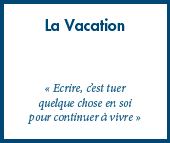|
|
For the English-speaking Reader >
American television, French screens
By Martin Winckler, as translated by Wendy Kristianasen
Article du 26 avril 2007
The only television shows from the United States that you could get to see in France in the 1970s were westerns, crime stories and a few comedies. French state-owned television, knowingly or not, avoided the most critical, politically engaged shows, particularly the medical and legal dramas. With the multiplication of channels in the 1980s, many more US shows began to appear on French screens, but even so, until 2000 US shows were usually regarded as unimaginative and politically correct.
The change in attitudes towards them was mostly due to the pioneer cable chain Jimmy which first showed NYPD Blue, Six Feet Under and The Sopranos. At last attentive French viewers could see that these shows dealt with controversial subjects. Today some series - Lost, Desperate Housewives - which are promoted by private distributors even make magazine covers. The impact of these series is not just their commercial success ; they are wonderful, full of sharp social comment and political commitment. Although the French press frequently ignores them (they appear neither in the entertainment review Télérama nor in Le Monde), they do offer radically different viewpoints.
US hospital series didn’t reach France until the end of the 1980s. Was this the result of an official fear that the French might get ’the wrong idea about medicine’, because the US series were always on the side of the patients and against the authorities ? ER had a powerful impact on the French public because of its detailed portrayal of accident and emergency staff, and because of the ethical questions it raised. There are newer medical series with equal impact, House, M.D. (TF6) about a misanthropic doctor (going against the stereotype) caught between his horror of lying and the erring ethical ways of medicine which regards itself as all-powerful. Grey’s Anatomy (TF1) shows the confusion of feelings and roles among carers, and the way that technical skills do not always guarantee common sense.
A number of television writers, drawing on an older tradition of progressive cinema, examine the place of the individual in society and use it to describe the difficulties that ordinary people have with the law or the state. The US lawyer and screenwriter Reginald Rose is known in France for his play Twelve Angry Men, which was filmed by Sydney Lumet in 1957. But no one in France knew that between 1961 and 1965 Rose tackled sensitive subjects, such as the death penalty, abortion and euthanasia, in his television law series, The Defenders. Ever since, US legal television series have been forums for asking questions.
David E Kelley, a lawyer by training and a great screenwriter, acutely observed US manners and the law through politically and socially tough series centred around lawyers, doctors and teachers : he contributed much to LA Law, created Picket Fences (TF1), Chicago Hope, Ally McBeal (M6), The Practice (Jimmy), Boston Public (France 2) and Boston Legal (TF1). His very personal style deftly mixes tragedy, melodrama and even musical comedy, and through these he deals with social, legal and ethical questions head on : cloning, surrogate motherhood, polygamy, censorship, and the influence of the church on people and state.
Law & Order (13e Rue), shown in France since 1990, dissects the US legal system. The police and the district attorneys, who apply the law and must deal with wrongdoers, are always in difficulties with victims’ families, defence lawyers and the media. The programme deals as often with petty than with serious crime, and speaks out against the transgressions of Wall Street companies, against the military and the arms trade, against big pharma experiments and against abuses of power by doctors, judges, police and lawyers. The programme spun off Law & Order Special Victims Unit (TF1) and Law & Order Criminal Intent (TF1), both of which are reality-based.
Screenwriter and producer René Balcer (the brain behind the parent show for 10 years, who then created the Criminal Intent spinoff and executive-directed it during the next five years) has been inspired by actual events, including the extradition proceedings over General Pinochet and the internment of US citizens of Arab origin after 9/11. A few months ago, Special Victims Unit had an interesting episode, screened at peak viewing time, on the many cover-ups after Hurricane Katrina : sexual offenders on conditional release who disappeared, criminals who absconded with tons of toxic substances from army labs.
The addictive series 24 (Canal +), which the French media liked, demonstrated perfectly the paranoia of the current US administration. Almost immediately after 9/11 a remarkable episode of the political drama, The West Wing (France 2), called on Americans to renounce hatred, fear and intolerance (1) : one of the advisers to the series’ president said the US was sheltering an extremist group as bad as al-Qaida - the Ku Klux Klan. The West Wing launched in 1999, and has just ended. In the US it was peak-hour viewing on NBC : in France it went out at 1 am.
The plot of one of the first episodes of Without a Trace (France 2) was based on post-9/11 nervousness : a trusted, devoted doctor of Saudi origin disappeared and was immediately suspected of planning a terror attack. The series depicts the US through what happens to very ordinary people caught up in very unordinary events.
CSI : Crime Scene Investigation and its spinoffs, CSI Miami and CSI Manhattan, are at present prestige presentations on TF1. Unsurprisingly, TF1 screens CSI Miami, the least interesting, at peak viewing time : it is eye-catching, violent and reactionary. While the original CSI, in which the harsh, dark nature of the human condition eclipses the sophisticated investigating techniques, is relegated to late-night scheduling.
Cold Case (France 2) is about the inquiries of a woman police inspector from Philadelphia who specialises in unsolved crimes. This magnificent show, created by veteran TV writer Meredith Stiehm, turns each investigation into a fascinating historical exploration of 20th century America, looking deep into McCarthyism, racial segregation, postwar internment, the disco age, and of course Vietnam. It pays homage to popular cinema from The Rocky Horror Picture Show to Cabaret. All praise to France 2 for deciding to show it throughout the summer on Sunday evenings, for it is, in my view, one of the best series ever made, proof that television series can be artistic expressions as rich as cinema or literature.
Le Monde Diplomatique, July 2006

Imprimer
|



